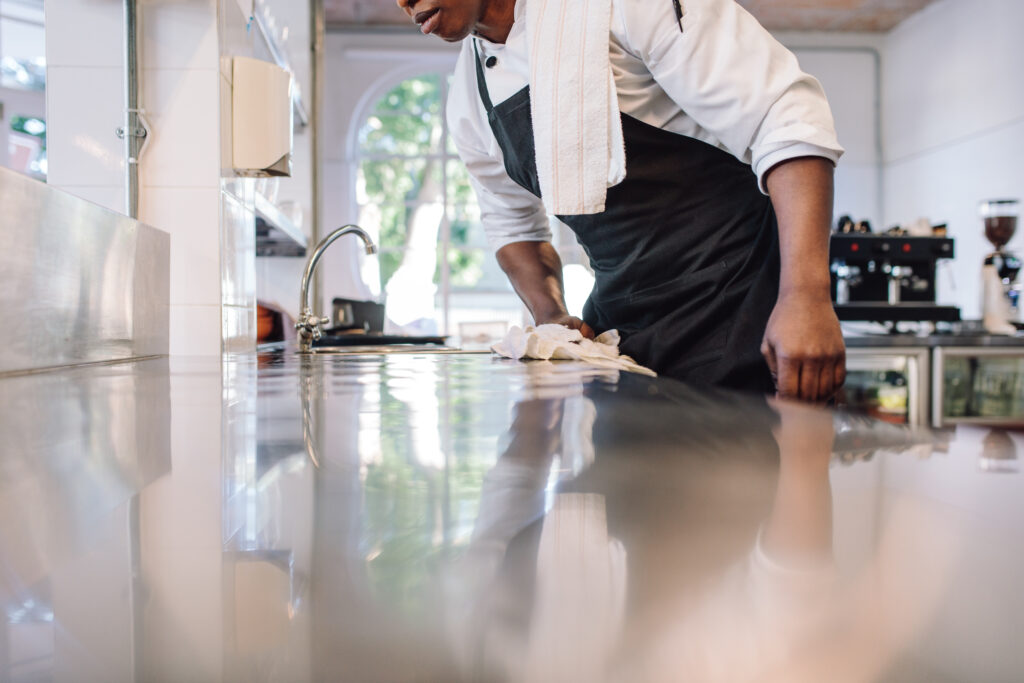The Importance of Kitchen Hygiene and how to Achieve it
Kitchen hygiene is a fundamental principle of operating in a kitchen. One of the most important aspects of kitchen hygiene is closely following hygiene rules in the kitchen in terms of food safety, correct clothing and regularly sanitising the kitchen.
In this month’s blog post, we explore personal hygiene rules in the kitchen and provide practical tips and guidelines to help you maintain high standards of cleanliness in the kitchen.
Why practice hygiene in the kitchen?
By creating hygiene rules in the kitchen, you can create a safe space and prevent the spread of harmful bacteria or chemicals in your home or commercial kitchen. Kitchen hygiene is all about being vigilant and conscious of your surroundings and practices. So, read below to discover our kitchen hygiene tips!

Rule 1. Wash your hands regularly
Arguably the most important rule in the kitchen is to wash your hands regularly. Hands can easily pick up bacteria and other contaminants throughout the day, and while cooking. Raw meat such as poultry, fish, and eggs can carry Salmonella or E.coli and can cause food borne illnesses if you don’t follow hand hygiene steps to avoid cross-contamination or accidental ingestion.
The proper hand hygiene steps to prevent the spread of bacteria in the kitchen are as follows:
Proper Handwashing Technique
The first of the hand hygiene steps is to ensure you’re washing your hands properly. Start by wetting your hands, lather them with soap, rub them together for at least 20 seconds (ensuring to reach all the nooks and crannies), and dry them thoroughly with a clean towel.
You should wash your hands before and after handling food, after using the restroom, blowing your nose, or touching any potentially contaminated surfaces.
Personal Hand Hygiene
You should endeavour to follow the same hand hygiene steps if you find yourself touching your face during the day. Your face is covered with oils and bacteria that we can assure you nobody wants in their food.
Avoid touching your face, keep your nails trimmed, and use hand sanitiser regularly when soap and water are not readily available. Following all of these hand hygiene steps will increase your kitchen hygiene overall.
.
Rule 2: Wear clothes, aprons, and catering hair nets
Another simple step you can follow to ensure proper kitchen hygiene is to wear the appropriate clothing. This includes aprons and hair nets. Purpose-made clothing is essential, as it guarantees basic kitchen safety.
Wearing the right clothing while in the kitchen can help to protect food from contamination, as it keeps bacteria away from the food.
Clothing can also protect against hot liquids, steam, and sharp objects, which can be a risk to your safety in the kitchen.
Appropriate clothing also helps you to create a professional and hygienic appearance in the kitchen, which can help to build trust and confidence among customers. Particular items of clothing, such as hair nets, can also prevent loose hair, fibres, and other particles from falling into the food.
Kitchen hygiene is an essential aspect of safely operating a kitchen, and proper clothing can help you to achieve and maintain.

.
Rule 3: Cook food thoroughly
Next on our list of kitchen hygiene rules is always cooking food thoroughly. This is crucial for maintaining safety and controlling potentially harmful bacteria.
The most important reason to cook food thoroughly is that high temperatures can kill harmful bacteria that cause foodborne illnesses, such as Salmonella, E.coli and Listeria. These bacteria can survive in raw or undercooked food but will be destroyed by heat.

Rule 4: Keep the kitchen clean and sanitised
We’ve talked about washing hands regularly and cooking food thoroughly, but now let’s discuss the importance of keeping the kitchen clean and sanitised. Another important kitchen hygiene rule is to always keep the kitchen clean and sanitised.
Upkeeping all other hygiene rules in the kitchen is practically pointless if your surfaces are dirty or contaminated. Cleaning and sanitation in the kitchen mean regularly wiping down surfaces, cleaning appliances and utensils, and disposing of any food waste properly.
Keeping the kitchen clean can help to prevent the growth of harmful bacteria and reduce the risk of contamination.
To ensure the kitchen is properly sanitised, it is important to use cleaning products that are effective against bacteria and viruses. Make sure to read and follow the instructions on cleaning products carefully, and only use them as directed. This will ensure optimum efficiency.
It is also important to use separate cleaning cloths for different surfaces to avoid cross-contamination.
In addition to regular cleaning, it is important to pay attention to the areas of the kitchen that are often overlooked. This includes the handles of the appliances, knobs and switches, and the floor. These areas can easily become contaminated with bacteria and viruses. So it is important to clean those regularly too.
By following these kitchen hygiene rules, you can rest assured that your food is safe and free from contamination.
As you can see, maintaining proper kitchen hygiene is crucial for the safety of your food and customers. By following these hygiene rules in the kitchen, you can achieve a clean and safe environment for food preparation.
How can Creeds Direct Help?
If you think that your kitchen equipment may be too far gone and no amount of cleaning can reverse the damage it has sustained over the years, browse our vast range of products here at Creeds Direct.
Whether you’re looking for new knives to replace your rusty old set or even a brand-new bread oven, we’ve got you covered. Check out one of our recent blogs to help you choose what kitchen must haves you need!
If you have any questions about any of our products, please don’t hesitate to contact us today to learn more. We employ a team of kitchen experts who are always happy to help in any way they can!

